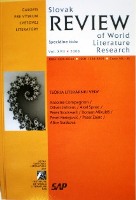Text, kontext, kultúra (O jednej z ťažiskových tendencií vo vývoji literárnej vedy v rokoch 1980–2000)
TEXT, CONTEXT, CULTURE
Author(s): Oliver JahrausSubject(s): Literary Texts
Published by: Ústav svetovej literatúry, Slovenská akadémia vied
Keywords: Literary Theory; System Theory; Literary Sociology; New Historicism; Semiotics; Cultural Poetics; Cultural Studies;
Summary/Abstract: The developments that have taken place in literary theory in the past two decades must be seen against the background of the debate regarding method that took place in the 1960s. In the latter, methodology – the question of how in the study of literature texts can be analysed on a rational basis – was still closely bound to the underlying interest of Literary theory in the following questions: from what elements does a Literary text derive us literariness, and to what extent is it these elements that should be studied and searched for in textual analysis;“ The result of this was that questions whose scope extended beyond the text tended to be offloaded onto other disciplines. In the 1980s, reflection on the foundations of the study of literature shifted from methodological and text-related issues of interpretation to issues involving literary theory in the true sense of the term and relating more strongly to context. The underlying interest of literary theory in what literature and the literariness of literary texts actually are was disconnected from methodological issues and explicit enquiry into the disciplinary status of the study of literature. The mutual relationship between text and context became the primary object of attention instead. Thus, there emerged new models that treat the text as defined not so much by strictly text-internal elements as by specific contexts; such models have been particularly prominent in the wide range of developments that have taken place in literary theory from the 1980s onward. However different these models may be from one another, they all show text and context entering into a dynamic, productive, and ultimately essential relationship with each another. This development therefore presents itself, in abstract form, as representative of a general development in literary theory since the 1980s. In the main strand of these developments, the concept of context can be expressed in terms of culture. “Context“ then becomes a word for a particular group of cultural phenomena that defines the literary text in any given case. It is against this background that the “literary studies as cultural studies” approach developed – an idea that cannot be reduced to an integrative and generally re-cognized model but that unfolds with a variety reflecting the number of different concepts of culture(s) there are. The following article identifies three categorially different and categorially representative cultural contexts that structure the field. These contexts can be society (as in adaptations of the social history of literature and systems theory in the study of literature); history (as in the New I Historicism and cultural poetics); or the evolutionary basis of culture, in particular its basis in evolutionary biology (as in biopoetics).
Journal: Slovak Review of World Literature Research
- Issue Year: 2008
- Issue No: 03
- Page Range: 14-33
- Page Count: 19
- Language: Slovak

